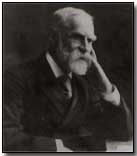Who's Who - Lord Bryce
 Viscount James Bryce
(1838-1922) was responsible for producing the influential
Bryce
Report into alleged German atrocities in occupied Belgium during 1914
and a subsequent
report on the Armenian Massacres
conducted by the Turkish government.
Viscount James Bryce
(1838-1922) was responsible for producing the influential
Bryce
Report into alleged German atrocities in occupied Belgium during 1914
and a subsequent
report on the Armenian Massacres
conducted by the Turkish government.
Following an education at Glasgow University and then at Oxford, Bryce practised law in London before taking up a professorship of civil law at Oxford. It was during this period that Bryce established a reputation as a notable historian, his works including History of the Holy Roman Empire, published in 1864.
Entering British politics Bryce established himself as a leading Liberal, serving as President of the Board of Trade and Chief Secretary to Ireland. His private travels through Russia to Arafat resulted in the publication of Transcaucasia and Ararat in 1878. Ten years later he published The American Commonwealth, in which he expressed his views on sociology and philosophy.
From 1907-13 Bryce served as Britain's highly respected Ambassador to the U.S., a popularity born out of his deep knowledge of and fondness for the United States.
Thus Bryce's appointment towards the close of 1914 by British Prime Minister Herbert Asquith to investigate reports of alleged German barbarity towards civilians in occupied Belgium was widely welcomed. His report, published the following May (Report of the Committee on Alleged German Outrages), was clear in its condemnation of the German Army's conduct in Belgium.
In spite of the report's tendency to highlight the more extreme examples of German rule in Belgium - and to cite unreliable evidence, which led to the report's being largely discredited in the immediate post-war years - it was viewed as credible in the United States, with consequent damage to German interests in Washington.
Publishing Modern Democracies in 1921, James Bryce died in 1922.
An "incendiary shell" is an artillery shell packed with highly flammable material, such as magnesium and phosphorous, intended to start and spread fire when detonated.
- Did you know?
